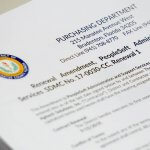In re Bilski appealed to the Supreme Court
The US Federal Court of Appeals ruling upholding the lower court decision for In re Bilski has now been appealed to the US Supreme Court:
Not since 1981 has the Supreme Court undertaken to spell out the kinds of inventions that are eligible for patent rights — the exclusive rights to produce or use an invented device or process, or to license it to others for a royalty fee. Much has changed since then in the world of commerce, not least the digital revolution. On Wednesday, the Court was asked to bring the law up to date — an effort that, it is clear, could be highly controversial, depending upon what path patent law modernization might take.
The new case is Bilski, et al., v. Doll (not yet assigned a docket number) — a case that has generated hot and even worldwide controversy since two inventors in 1997 filed an application for a patent on a new method of conducting business. In much-simplified form, the method devised by Bernard L. Bilski and Rand A. Warsaw provides ways to hedge against the business risks that come with the inevitable rise and fall of prices for commodities. (The petition filed Wednesday is available in a link contained within this press release. The link includes the lower court decision at issue; it is a large file.)
On the one side of this controversy in its largest sense are those — like Bilski and Warsaw themselves — who argue that patents must be available to encourage innovation in devising new ways to conduct business in the global information-based economy, including encouragement for new ways of digitizing business methods.
On the other side are consumer advocacy groups and free-market devotees who worry that patent monopolies could tie up methods of creative thought processes, including teaching, judging, creative writing, making medical judgments, or picking juries (some current, real examples of claims).
There is also the possibility, or so it is argued, that the validity of thousands of existing patents may now be in question under a new test of patent eligibility that is at the center of the new case. That is a test devised by the Federal Circuit Court of Appeals, in a 9-3 en banc decision last October rejecting patents on all of the Bilski-Warsaw claims.
Of course, this doesn’t mean that the Supreme Court will take the case. But if they do, it could have some profound implications for patent law, and in particular for process and software patents, depending upon how the justices rule and how broad or narrow their ruling is. ..bruce..




![The Meltdown/Spectre CPU bugs: a dramatic global case of the “Unintended Consequences” pattern [UPDATED 4/4/18] The Meltdown/Spectre CPU bugs: a dramatic global case of the “Unintended Consequences” pattern [UPDATED 4/4/18]](http://bfwa.com/wp-content/uploads/2018/01/intel-cpu-150x150.jpg)